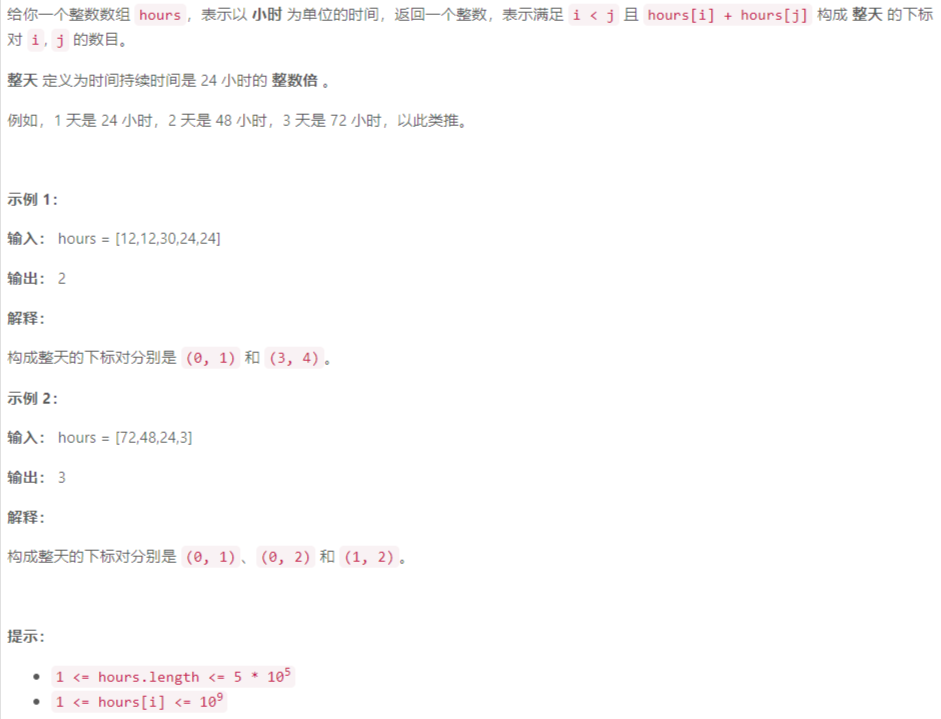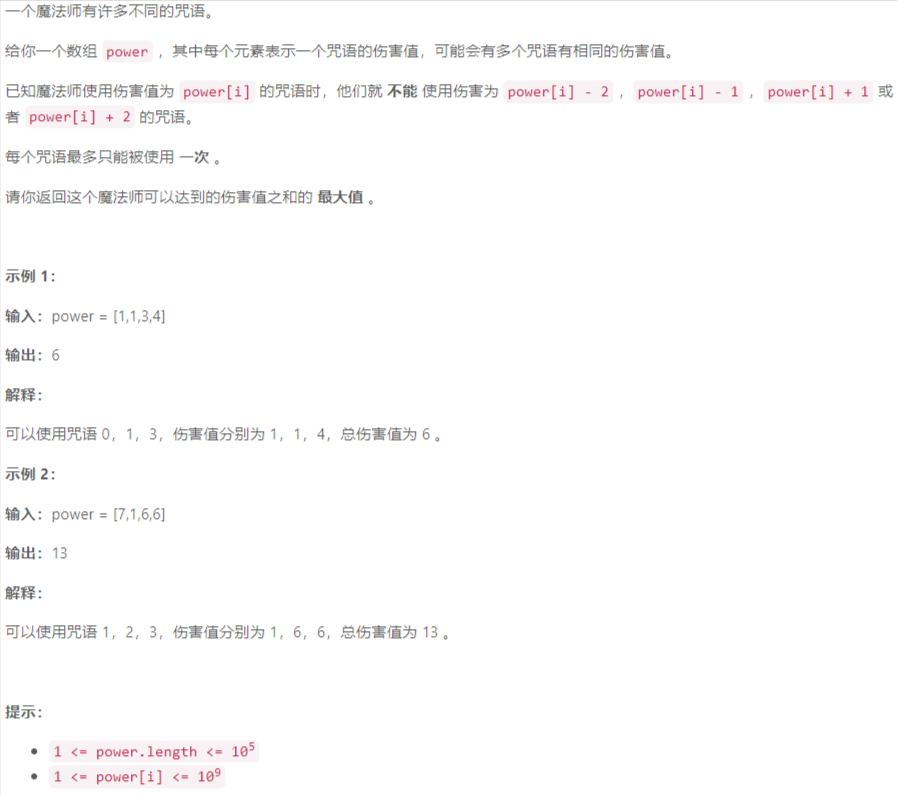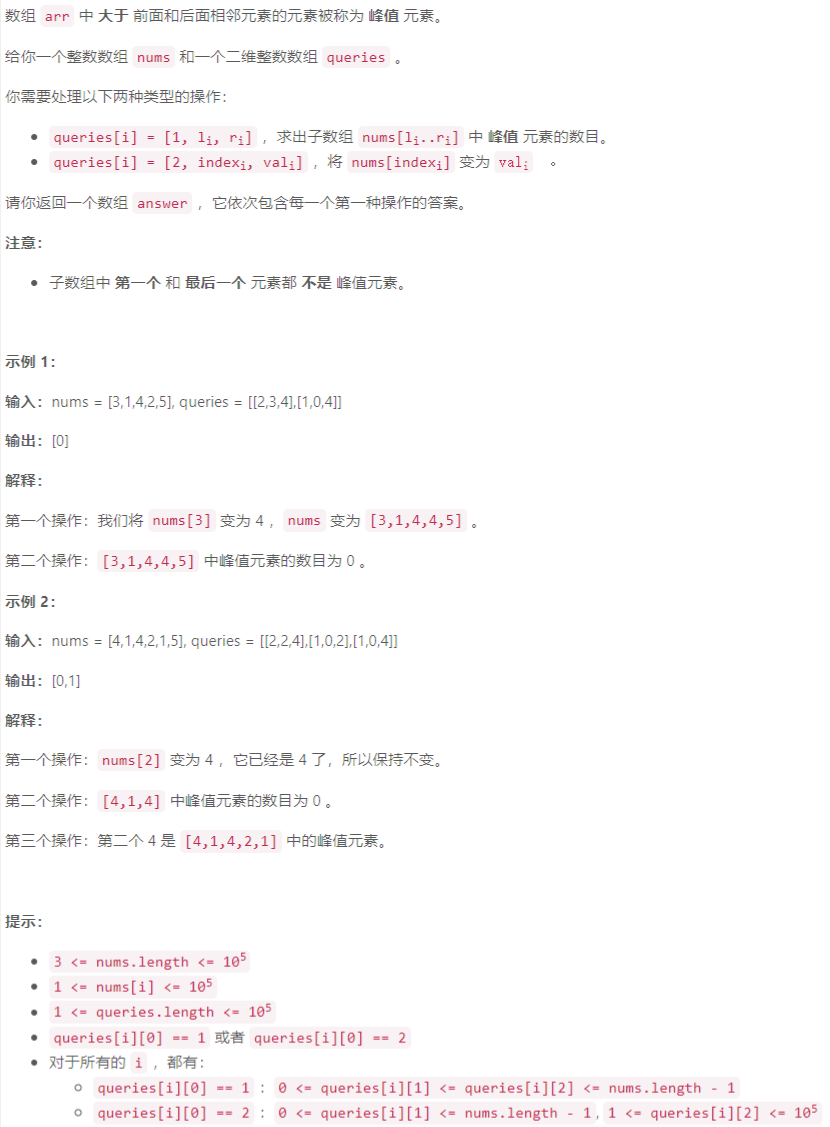A 构成整天的下标对数目 I

计数:遍历 h o u r s hours hours ,记录 h o u r s [ i ] % 24 hours[i]\%24 hours[i]%24 的出现次数
cpp
class Solution {
public:
long long countCompleteDayPairs(vector<int>& hours) {
vector<int> cnt(24);
long long res = 0;
for (auto x : hours) {
res += cnt[(24 - x % 24) % 24];
cnt[x % 24]++;
}
return res;
}
};B 构成整天的下标对数目 II

计数:遍历 h o u r s hours hours ,记录 h o u r s [ i ] % 24 hours[i]\%24 hours[i]%24 的出现次数
cpp
class Solution {
public:
long long countCompleteDayPairs(vector<int>& hours) {
vector<int> cnt(24);
long long res = 0;
for (auto x : hours) {
res += cnt[(24 - x % 24) % 24];
cnt[x % 24]++;
}
return res;
}
};C 施咒的最大总伤害

动态规划:设 p [ i ] p[i] p[i] 为最大伤害值不超过 i i i 的最大伤害值之和
cpp
class Solution {
public:
using ll = long long;
long long maximumTotalDamage(vector<int>& power) {
map<int, ll> s;
for (auto x : power)
s[x] += x;
map<int, ll> p;
for (auto it = s.begin(); it != s.end(); it++) {
p[it->first] = it == s.begin() ? 0 : p[prev(it)->first];
auto lb = s.lower_bound(it->first - 2);
if (lb == s.begin())
p[it->first] = max(p[it->first], it->second);
else {
p[it->first] = max(p[it->first], p[prev(lb)->first] + it->second);
}
}
return p.rbegin()->second;
}
};D 数组中的峰值

树状数组:用树状数组维护前缀区间内的峰值元素数,对于更新 n u m s [ i n d e x ] nums[index] nums[index] 的操作,可能改变是否为峰值的位置有 i n d e x − 1 index-1 index−1 、 i n d e x index index 和 i n d e x + 1 index+1 index+1
cpp
class Solution {
public:
vector<int> countOfPeaks(vector<int>& nums, vector<vector<int>>& queries) {
int n = nums.size();
BinaryIndexedTree bit(n);
auto isval = [](int i, int j, int k) { return j > i && j > k; };
for (int i = 1; i < n - 1; i++)
if (isval(nums[i - 1], nums[i], nums[i + 1]))
bit.add(i + 1, 1);//初始化
vector<int> res;
for (auto& qi : queries) {
if (qi[0] == 1) {
if (qi[2] - qi[1] + 1 > 2)
res.push_back(bit.query(qi[2]) - bit.query(qi[1] + 1));
else
res.push_back(0);
} else { // update
int i = qi[1];
int val = qi[2];
if (i - 1 > 0) {//判断nums[i-1]是否改变峰值性
if (!isval(nums[i - 2], nums[i - 1], nums[i]) && isval(nums[i - 2], nums[i - 1], val))
bit.add(i - 1 + 1, 1);
else if (isval(nums[i - 2], nums[i - 1], nums[i]) && !isval(nums[i - 2], nums[i - 1], val))
bit.add(i - 1 + 1, -1);
}
if (i + 1 < n - 1) {//判断nums[i+1]是否改变峰值性
if (!isval(nums[i], nums[i + 1], nums[i + 2]) && isval(val, nums[i + 1], nums[i + 2]))
bit.add(i + 1 + 1, 1);
else if (isval(nums[i], nums[i + 1], nums[i + 2]) && !isval(val, nums[i + 1], nums[i + 2]))
bit.add(i + 1 + 1, -1);
}
if (i != 0 && i != n - 1) {//判断nums[i]是否改变峰值性
if (!isval(nums[i - 1], nums[i], nums[i + 1]) && isval(nums[i - 1], val, nums[i + 1]))
bit.add(i + 1, 1);
if (isval(nums[i - 1], nums[i], nums[i + 1]) && !isval(nums[i - 1], val, nums[i + 1]))
bit.add(i + 1, -1);
}
nums[i] = val;
}
}
return res;
}
class BinaryIndexedTree {//树状数组模板
public:
int N;
vector<int> a;
BinaryIndexedTree(int n) {
N = n;
a = vector<int>(N + 1);
}
inline int lowbit(int x) {
return x & -x;
}
void add(int loc, int val) { // li[loc]+=val;
for (; loc <= N; loc += lowbit(loc))
a[loc] += val;
}
int query(int loc) { // sum{li[k] | 1<=k<=loc}
int res = 0;
for (; loc > 0; loc -= lowbit(loc))
res += a[loc];
return res;
}
};
};